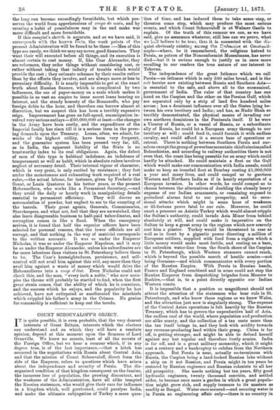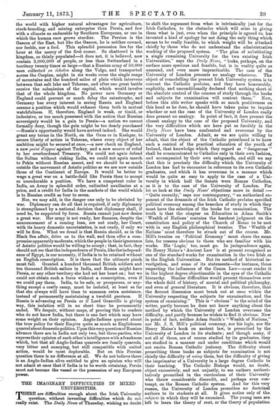COUNT SCHOUVALOFF'S OBJECT.
IT is quite possible, it is even probable, that the very dearest interests of Great Britain, interests which the electors can understand and on which they will have a resolute opinion, depend at this moment upon the firmness of Lord Granville. We know no secrets, least of all the secrets of the Foreign Office, but we hear a rumour which, if in any degree true, is of the last importance,—that a hitch has occurred in the negotiations with Russia about Central Asia, and that the mission of Count Schouvaloff, direct from the side of the Emperor, refers to questions which have arisen about the independence and security of Persia. The dis- organised condition of that kingdom consequent on the famine, the immense loss of population, the growing discontent, and the weakness of the Administration, have all alike tempted the Russian statesmen, who would give their ears for influence in a kingdom which, well garrisoned, could paralyse India, and make the ultimate subjugation of Turkey a mere ques-
tion of time, and has induced them to take some -step, or threaten some step, which may produce the most serious events, and which Count Schouvaloff is at Wainer Castle to explain. Of the truth of this rumour we can, as we have said, give no assurance whatever, still less can we prove, what we half believe to be true, that it is connected with the dis- quiet obviously existing among the Embasslas at Couata,uti- nople—where, be it remembered, the religious hatred to Persia, as patron of the Nonconformist Mussulmans, has never died—but it is serious enough to justify us in . once• more recalling to our readers the true nature of our interest in Teheran.
The independence of the great Isthmus which we call Persia—an isthmus which is only 500 miles broad, and is the sole barrier now existing between Russia and Southern Asia— is essential to the safe, and above all to the economical, government of India. The ruler of that country has one hand on the Caspian and the other on the Persian Gulf, which are separated only by a strip of land five hundred miles across ; has a dominant influence over all the States lying be- tween his own territory and India; and has, as Nadir Shah so terribly demonstrated, the physical means of invading our own northern dominions in the Peninsula itself. If he were a Viceroy of Russia, or a vassal of Russia, or a subordinate ally of Russia, he could let a European army through to our territory at will ; could feed it, could furnish it with endless cavalry, and could afford it a secure base of operations or retreat. There is nothing between Southern Persia and our- selves except the group of powerless mountain chieftaincies called Beloochistan, and according to railway authorities there is not even that, the coast line being passable for an army which could hardly be attacked. He could maintain a fleet on the Gulf which would make our communication• with India unsafe, could make us keep an ironclad fleet at Bombay costing £1,000,000 a year and many lives, and could compel us to garrison Western and Northern India as if in hourly expectation of a European invasion. In other words, he could compel us to choose between the alternatives of doubling the already heavy expense of our Indian armaments, or remaining exposed to periodical alarms fatal to our prosperity, and to occa- sional attacks which might in some hour of weakness or ill-fortune prove fatal to our rule. Moreover, he could exert a pressure on Asiatic Turkey which would almost cripple the Sultan's authority, could invade Asia Minor from behind absolutely at will, and could make it imperative on the Sultan to keep a great army in the regions which now scarcely cost him a piastre. Turkey would be threatened in rear as well as in front by a gigantic power directing a million of European soldiers, supplied with food from a region which a little money would make most fertile, and resting on a base, the unbroken water-line from the South shore of the Caspian to St. Petersburgh, which Western steamers cannot reach, which is beyond the possible march of hostile armies—not being Germans—and which communicates with every portion of the Russian Empire. With Persia in Russian hands, France and England combined and in arms could not stop the Russian Emperor from despatching brigades from Moscow to Bushire,—that is, to a point directly opposite our Indian Western coasts.
It is impossible that a position so magnificent should not attract the attention of the statesmen who bear rule in St. Petersburgh, and who know these regions as we know Wales, and the attraction just now is singularly strong. The expense of the Central Asian operations is felt heavily by the Russian Treasury, which has to govern the unproductive half of Asia,
the endless roof of the world, where population and production are alike scanty, and the collection of a tax costs more than the tax itself brings in, and they look with avidity towards any revenue-producing land within their grasp. China is far off, is getting stronger, and might be able to defend herself against any but regular and therefore costly armies. India is far off, and is a great military monarchy, which it might cost a century and a bankruptcy to subdue from the Northern approach. But Persia is near, actually co-terminous with Russia, the Caspian being a land-locked Russian lake without a ship on it not Russian, and Persia might in ten years be restored by Russian engineers and Russian colonists to all her old prosperity. She needs nothing but ten years, fifty good hydraulic engineers, twenty thousand convicts, and settled order, to become once more a garden in which a great popula- tion might grow rich, and supply treasure to its masters as readily as Bengal. Water once secured—and securing water is in Persia an engineering affair only—there is no country in
the world with higher natural advantages for agriculture, stock-breeding, and mining enterprise than Persia, and few with a climate so endurable by Southern Europeans, or one in which the human race grows sturdier. The Persian is the Gascon of the East, but like the Gascon, he is neither coward, nor feeble, nor a fool. This splendid possession lies for the hour at the mercy of the first corner. So shattered is the kingdom, so thinly populated—it does not, it is believed, now contain 3,000,000 of people, or less than Switzerland in a territory twenty times as large—that a Russian army of 50,000 men collected en echelon along the Volga, and transported across the Caspian, might in six weeks cross the single range of mountains and the hundred miles of plain which intervene between that salt lake and Teheran, and after one great battle receive the submission of the capital, which would involve that of the whole kingdom. No power save Germany or England could prevent or much delay the catastrophe, and Germany has every interest in seeing Russia and England assume a position which would exhaust them both in mutual watchfulness. If, therefore, England is weak, or timid, or indecisive, or too much possessed with the notion that Russian sovereignty would be a gain to Persia—a notion we cannot formally deny, though the gain might be too dearly purchased —Russia's opportunity would have arrived indeed. She would grant any terms in the North, on the Oxus or in Kashgar, to secure liberty of action in Teheran, where every object of her ambition might be secured at once,—a new check on England, a new point d'appui against Turkey, and a new source of relief to her overburdened Treasury. We could not again defend the Sultan without risking India, we could not again march to Pekin without Russian assent, and we should be as much outside the movement of Asiatic politics as we are now outside those of the Continent of Europe. It would be better to wage a great war on a battle-field like Persia than to accept so unendurable a position. We have a competent ruler in India, an Army in splendid order, unlimited auxiliaries at a price, and a credit for India in the markets of the world which is to Russian credit as four to seven.
Nor, we may add, is the danger one only to be obviated by war. Diplomacy can do all that is required, if only diplomacy is strengthened by a national decision that diplomacy shall, if need be, be supported by force. Russia cannot just now desire a great war. Her army is not ready, her finances, despite the announcement of a coming loan, are not ready, her Court, with its heavy domestic uncertainties, is not ready, if only we will be firm. What we dread is that Russia should, as in the Black Sea affair, drive us to the wall, and then offer a com- promise apparently moderate, which the people in their ignorance of Asiatic politics would be willing to accept ; that, in fact, they should not see that the independence of Persia, like the independ- ence of Egypt, is our necessity, if India is to be retained without an English conscription. It is there that the ultimate pinch must fall. Granted a hundred thousand British soldiers and ten thousand British sailors in India, and Russia might have Persia, or any other territory she had set her heart on ; but we could not obtain such a force without a conscription, even if we could pay them. India, to be safe, or prosperous, or any- thing except a costly camp, must be isolated, at least so far that she always will have time to summon extra assistance, instead of permanently maintaining a twofold garrison. If Russia is advancing on Persia or if Lord Granville is giving way, this isolation will in no short time be permanently ended. We despair, without maps, of proving this to readers who do not know India, but there is one fact which may have some weight on their opinion. Anglo-Indians quarrel about the true policy for their Empire quite as much as Englishmen quarrel about domestic politics. Upon this very question of Russian advance there are in India not only two, but three parties, who express their opinion of each other's intelligence with a frankness which, but that all Anglo-Indian quarrels are family quarrels, very bitter and annoying, but still compatible with united action, would be most deplorable. But on this Persian question there is no difference at all. We do not believe there is an Anglo-Indian alive entitled to give an opinion who will not admit at once that if India is to be worth retaining, Persia must not become the vassal or the possession of any European power.



































 Previous page
Previous page